It’s pretty much obvious to research the web before stepping into the online business. First thing come what CMS is this site using? And why not you can apply and nurture the same too in a similar fashion.
And why not use a CMS checker tool? Because creating an online earning platform isn’t as easy as it might sound, and you might hear from the online gurus. You need to create a website that offers the best to the users and let it convert for you too. Choosing a CMS for your website could play a vital role; you need to pick the best CMS among the others available in the market.
And that makes us go for research and observe what CMS other popular websites are using. This is where a website CMS detector can come to the rescue.
How do I find CMS?
No worries, being a web designer, I will share the best CMS detection tools that would help and extract the technology information of other websites.
What is a CMS?
It’s good to know about CMS first of all. A Content Management System is abbreviated as CMS. A CMS is a software that allows you to create a website and manage the graphical and textual content in it with ease.
There are several popular and Best Content Management systems in the industry, like,
| WordPress | Magento | Shopify |
| Joomla | Drupal | Squarespace |
| Weebly | Wix | ModX |
But the most popular one is WordPress.org, serving more than 36% of the websites around the globe and growing. It’s open-source software too, which states it’s completely free to use. And moreover, its flexibility offers even a non-techie can start a blog and manage it with ease. Yes, you’re right, you don’t need any coding skills to do so.
You need to install WordPress on a WordPress Hosting account, install a WordPress theme, and a few essential plugins, and you are good to go. WordPress is a huge community, so there are a lot of plugins and WordPress themes, and Website builders are being continuously developed by developers. You just need to plug and play as per the requirement.
Moreover, WordPress security can also be done with ease compared to others.
What CMS is this site using at all?
There could be multiple ways to determine and detect the CMS, manually by checking the source code, or using CMS detector tools as well. The drawback of checking CMS manually is, it could get easier for popular CMS like WordPress, Joomla, Squarespace, and even Shopify. But there are several more CMS in the industry, and the source code might not be able to deliver all the info.
Moreover, not everyone is that techie to check the source code manually. So in this post, we will focus on tools, which are the fastest way and will save your time too, and all these tools can detect CMS for free.
Okay, you want to know how to check the CMS manually?
Manual Ways to Check What CMS the site is using
So, do you want to know the general ways of knowing what CMS a website uses as well? Nothing wrong, it’s good to know how you can detect CMS without tools as well.
Even though the webmaster tries to hide the basic information about the CMS versions and all, you can still guess what CMS a site is using by looking at some clues.
Best CMS Detectors: Check What CMS a Site is Using
Now let’s begin with the best CMS detectors online to sneak into other website’s technologies.
1. What CMS
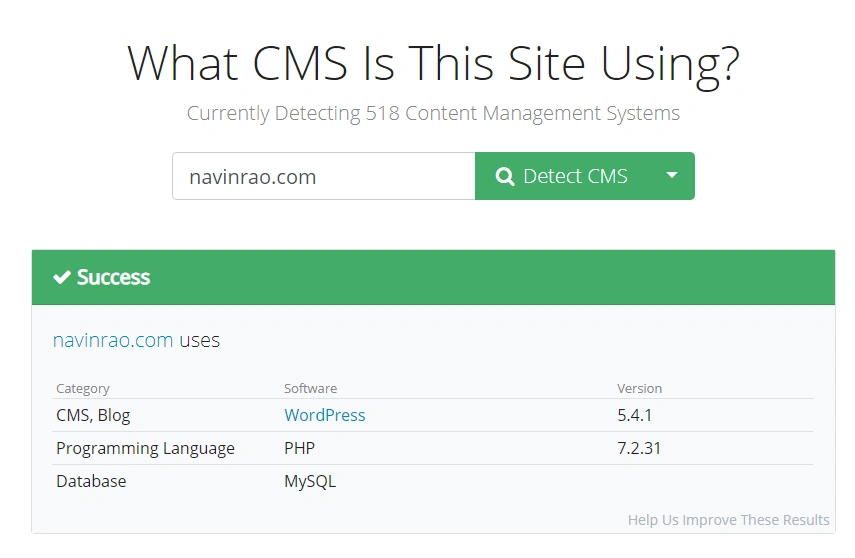
I first used this CMS at first because it can detect more than 492 CMS software. And the best part is, it keeps on updating quickly for new content management systems. It could be considered one of the most reliable CMS detector tools and beginner-friendly.
It has a clean look and extracts the exact info that you might need. Along with CMS, it also shows the programming language the site is using.
2. BuiltWith
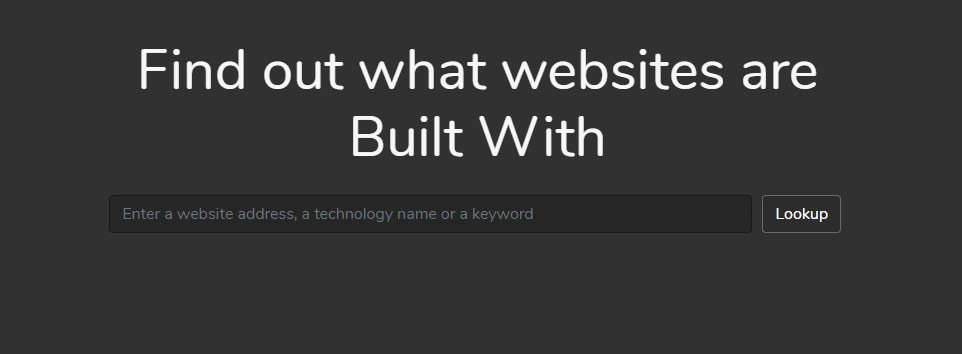
If you’re a web developer, you will love this. It provides very detailed information about any site in seconds. It will walk you through all the technologies and tools a website uses. Put the URL in the box and hit the lookup button. It will serve you with CMS, analytics, and Frameworks. SSL, Hosting Providers, the website is using, and even the widgets used too.
BuiltWith is basically not for the general users or beginners, as it can be a bit confusing. Because a lot of techie things are being hung over one place, you need to keep scrolling.
3. Wappalyzer
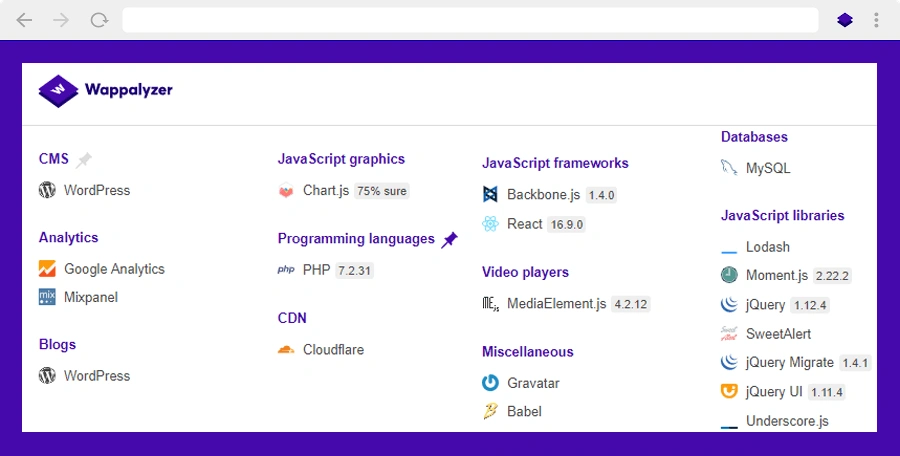
Well, this is my favorite tool that uniformly extracts detailed information. Not just CMS, it extracts various technologies, Analytics, Programming Languages, Frameworks, Text Editors, CDN, Databases, Fonts, scripts, libraries, and even more. You might have got the idea, looking at the above screenshot.
One more reason, I love it because it also comes with a Chrome extension. So you don’t have to go to the website. Install the Wappalyzer Chrome extension, and you are good to go.
4. W3Techs
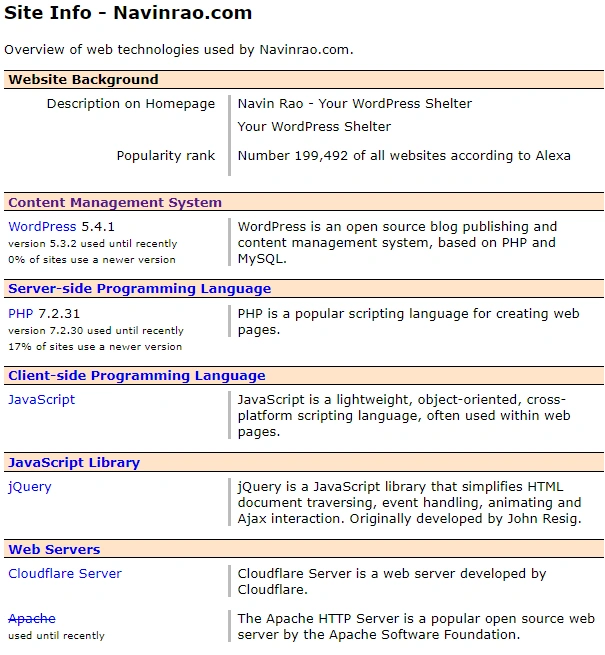
This is another popular website that is known for showing any kind of statistics around the World Wide Web Technology Surveys. This lets you evaluate all the technologies that other websites are using and even which hosting provider is helping them to grow their business.
It’s easier to know what cms that site is using. This is an old and very dependable CMS detector tool. You just need to visit the site and drop the URL in the given field, and look up the results. The website has a very minimal interface but works well, drilling down to all the required info.
5. NetCraft Site Report
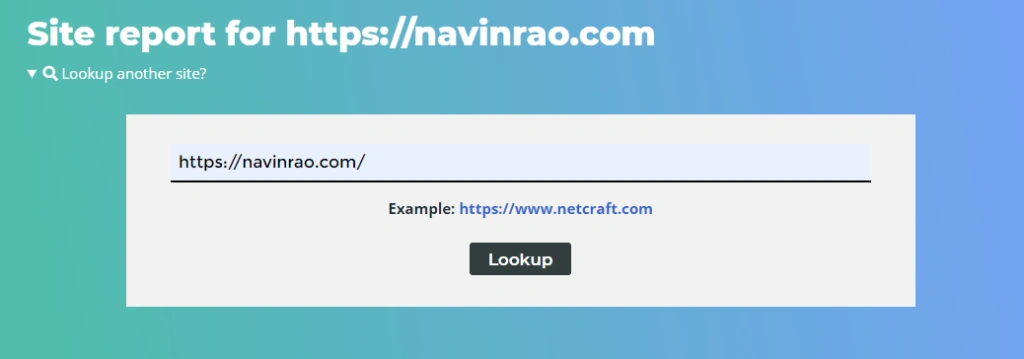
Netcraft is quite an old website, like W3techs. It provides a wide range of information on the website. Whether it could be DNS records, hosting provider, Sender Policy Framework (SPF), DMARC, Web Trackers, Site Technology, Server-side info, Content Delivery Network (CDN), Web Stats, HTML and CSS usage, and whatnot.
It is not just a CMS detector for your website, but more than that.
Conclusion
While starting a website every everyone takes some other website into consideration for reference purposes.
That’s a good idea, if you want to make money online, what other technologies is the website equipped with? Using CMS detector tools is the best way to find what CMS a website is using. Most of the time, we can find WordPress, as it is reporting more than 36% of the websites right now on the web. This is why my first website to start a blog or create a website for clients is always WordPress.
What could be better than using such tools to detect the CMS to see what cms a website is using? You will also get information about hosting, themes, and plugins they are using.